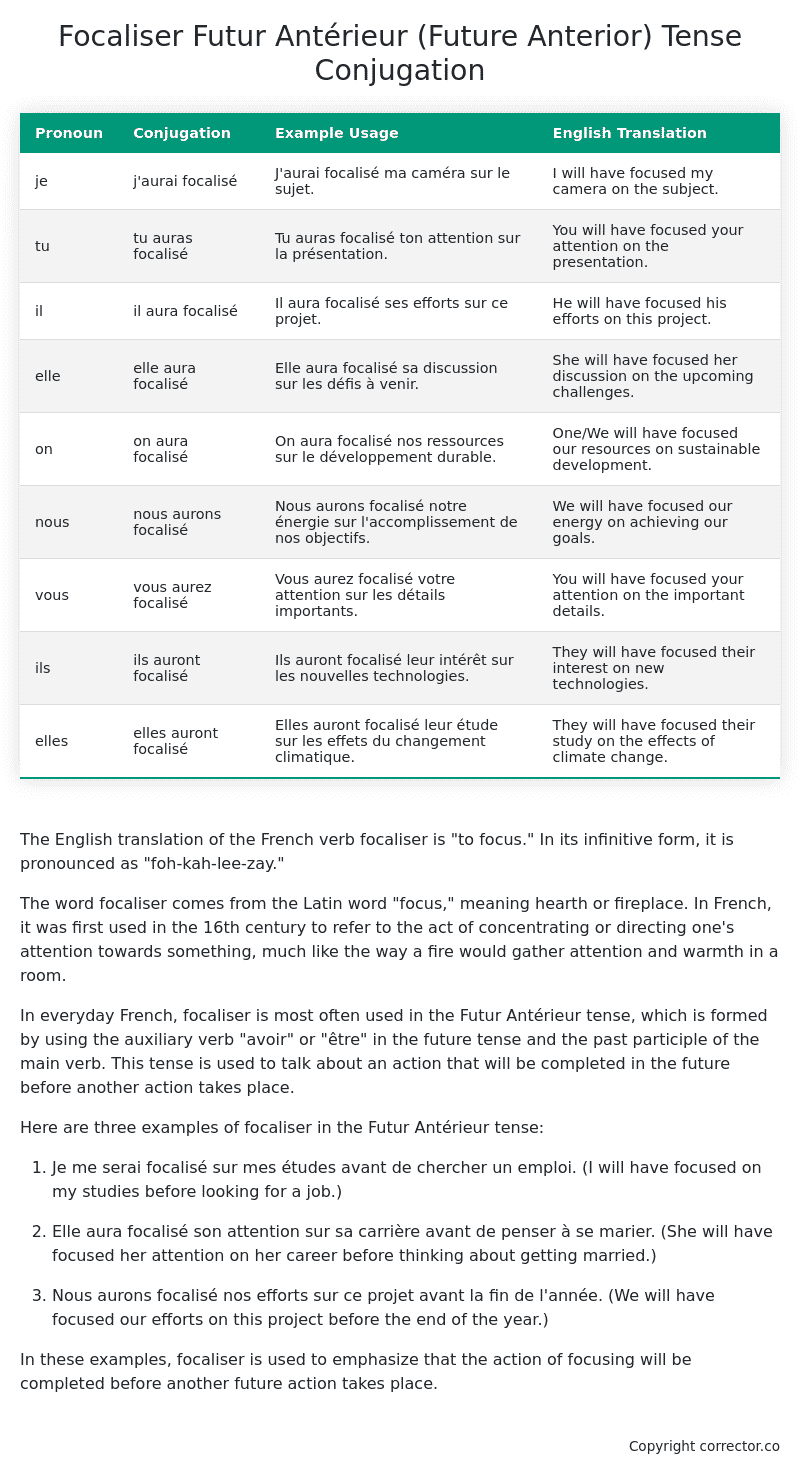Futur Antérieur (Future Anterior) Tense Conjugation of the French Verb focaliser
Introduction to the verb focaliser
The English translation of the French verb focaliser is “to focus.” In its infinitive form, it is pronounced as “foh-kah-lee-zay.”
The word focaliser comes from the Latin word “focus,” meaning hearth or fireplace. In French, it was first used in the 16th century to refer to the act of concentrating or directing one’s attention towards something, much like the way a fire would gather attention and warmth in a room.
In everyday French, focaliser is most often used in the Futur Antérieur tense, which is formed by using the auxiliary verb “avoir” or “être” in the future tense and the past participle of the main verb. This tense is used to talk about an action that will be completed in the future before another action takes place.
Here are three examples of focaliser in the Futur Antérieur tense:
-
Je me serai focalisé sur mes études avant de chercher un emploi.
(I will have focused on my studies before looking for a job.) -
Elle aura focalisé son attention sur sa carrière avant de penser à se marier.
(She will have focused her attention on her career before thinking about getting married.) -
Nous aurons focalisé nos efforts sur ce projet avant la fin de l’année.
(We will have focused our efforts on this project before the end of the year.)
In these examples, focaliser is used to emphasize that the action of focusing will be completed before another future action takes place.
Table of the Futur Antérieur (Future Anterior) Tense Conjugation of focaliser
| Pronoun | Conjugation | Example Usage | English Translation |
|---|---|---|---|
| je | j’aurai focalisé | J’aurai focalisé ma caméra sur le sujet. | I will have focused my camera on the subject. |
| tu | tu auras focalisé | Tu auras focalisé ton attention sur la présentation. | You will have focused your attention on the presentation. |
| il | il aura focalisé | Il aura focalisé ses efforts sur ce projet. | He will have focused his efforts on this project. |
| elle | elle aura focalisé | Elle aura focalisé sa discussion sur les défis à venir. | She will have focused her discussion on the upcoming challenges. |
| on | on aura focalisé | On aura focalisé nos ressources sur le développement durable. | One/We will have focused our resources on sustainable development. |
| nous | nous aurons focalisé | Nous aurons focalisé notre énergie sur l’accomplissement de nos objectifs. | We will have focused our energy on achieving our goals. |
| vous | vous aurez focalisé | Vous aurez focalisé votre attention sur les détails importants. | You will have focused your attention on the important details. |
| ils | ils auront focalisé | Ils auront focalisé leur intérêt sur les nouvelles technologies. | They will have focused their interest on new technologies. |
| elles | elles auront focalisé | Elles auront focalisé leur étude sur les effets du changement climatique. | They will have focused their study on the effects of climate change. |
Other Conjugations for Focaliser.
Le Present (Present Tense) Conjugation of the French Verb focaliser
Imparfait (Imperfect) Tense Conjugation of the French Verb focaliser
Passé Simple (Simple Past) Tense Conjugation of the French Verb focaliser
Passé Composé (Present Perfect) Tense Conjugation of the French Verb focaliser
Futur Simple (Simple Future) Tense Conjugation of the French Verb focaliser
Futur Proche (Near Future) Tense Conjugation of the French Verb focaliser
Plus-que-parfait (Pluperfect) Tense Conjugation of the French Verb focaliser
Passé Antérieur (Past Anterior) Tense Conjugation of the French Verb focaliser
Futur Antérieur (Future Anterior) Tense Conjugation of the French Verb focaliser (this article)
Subjonctif Présent (Subjunctive Present) Tense Conjugation of the French Verb focaliser
Subjonctif Passé (Subjunctive Past) Tense Conjugation of the French Verb focaliser
Subjonctif Imparfait (Subjunctive Imperfect) Tense Conjugation of the French Verb focaliser
Subjonctif Plus-que-parfait (Subjunctive Pluperfect) Tense Conjugation of the French Verb focaliser
Conditionnel Présent (Conditional Present) Tense Conjugation of the French Verb focaliser
Conditionnel Passé (Conditional Past) Tense Conjugation of the French Verb focaliser
L’impératif Présent (Imperative Present) Tense Conjugation of the French Verb focaliser
L’infinitif Présent (Infinitive Present) Tense Conjugation of the French Verb focaliser
Struggling with French verbs or the language in general? Why not use our free French Grammar Checker – no registration required!
Get a FREE Download Study Sheet of this Conjugation 🔥
Simply right click the image below, click “save image” and get your free reference for the focaliser Futur Antérieur tense conjugation!

Focaliser – About the French Futur Antérieur (Future Anterior) Tense
Construction
Common Everyday Usage Patterns
Interactions with Other Tenses
For example
Summary
I hope you enjoyed this article on the verb focaliser. Still in a learning mood? Check out another TOTALLY random French verb conjugation!


